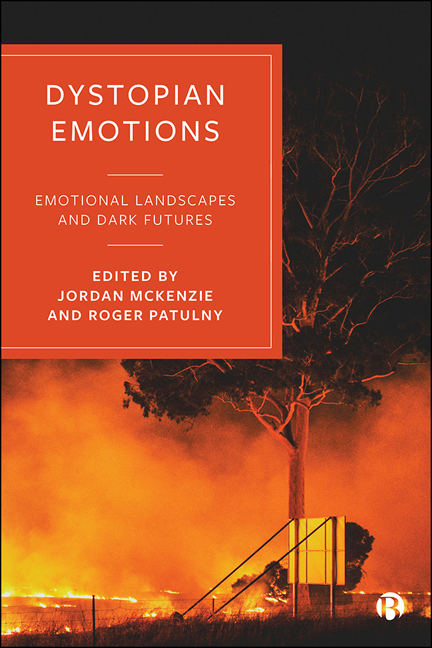Book contents
- Frontmatter
- Contents
- Notes on Contributors
- Acknowledgements
- Introduction: The Feeling of Dystopia
- 1 Borderland Emotions: A Case Study of Youths in Kinmen, Taiwan
- 2 Beyond Wicked Facebook: A Vital Materialism Perspective
- 3 Detangling Online Dystopias: Emotional Reflexivity and Cyber-Deviance
- 4 Mass Emotional Events: Rethinking Emotional Contagions after COVID-19
- 5 Between the Nationalists and the Fundamentalists, Still We Have Hope!
- 6 ‘The New Economy and the Privilege of Feeling’: Towards a Theory of Emotional Structuration
- 7 Neo-Villeiny University
- 8 Resuscitating the Past: Zygmunt Bauman’s Critical Analysis of the Recent Rise of Retrotopia
- 9 Hope Out of Stock: Critical and Melancholic Hope in Climate Fiction
- Conclusion: A Critical Mass of Emotions – Reflexivity, Loneliness and Hope?
- Index
1 - Borderland Emotions: A Case Study of Youths in Kinmen, Taiwan
Published online by Cambridge University Press: 13 May 2022
- Frontmatter
- Contents
- Notes on Contributors
- Acknowledgements
- Introduction: The Feeling of Dystopia
- 1 Borderland Emotions: A Case Study of Youths in Kinmen, Taiwan
- 2 Beyond Wicked Facebook: A Vital Materialism Perspective
- 3 Detangling Online Dystopias: Emotional Reflexivity and Cyber-Deviance
- 4 Mass Emotional Events: Rethinking Emotional Contagions after COVID-19
- 5 Between the Nationalists and the Fundamentalists, Still We Have Hope!
- 6 ‘The New Economy and the Privilege of Feeling’: Towards a Theory of Emotional Structuration
- 7 Neo-Villeiny University
- 8 Resuscitating the Past: Zygmunt Bauman’s Critical Analysis of the Recent Rise of Retrotopia
- 9 Hope Out of Stock: Critical and Melancholic Hope in Climate Fiction
- Conclusion: A Critical Mass of Emotions – Reflexivity, Loneliness and Hope?
- Index
Summary
Introduction
Based on an ethnographic study of 34 Kinmenese youths during the period 2016–18, this chapter examines the contradictory emotions experienced by young people when facing uncertainty about the future. Drawing upon scholarly literature on emotions and intersectionality, I use the term ‘borderland emotions’ to make sense of multiple and complex emotions experienced by Kinmen youths of diverse gender, sexuality and class backgrounds living in a geopolitically marginalized place. This research advances our understanding of how emotions are experienced by marginalized individuals living in a specific geopolitical time-space, through illustrating the dynamics of belonging among young women and sexual minorities from Kinmen. Notions of time and space are not only limited to geographical and physical descriptions or definitions. Rather, one's emotions often shift and change as a result of interacting with the past, the future and spatial dimensions. Time and space hold up particular nodes of history and culture. We also develop our emotional attachment to specific time periods and spaces in our lives. Furthermore, our social worlds develop around them as we form feelings of belonging through our everyday social interactions. Power relations within social worlds can shape our emotions and affect how we form our feelings of belonging. For people living in and from Kinmen, their emotions are often tied to the island's rapid social transformations under globalization and geopolitics. As Yuval-Davis (2011) points out, emotional attachment is a critical dimension of an individual's sense of belonging. However, interrogations into how people feel and negotiate emotions in defining their senses of belonging have often been overlooked (Wood and Waite, 2011).
Kinmen County, also known as Quemoy, is located in the southwest of the main island of Taiwan and only six kilometres to the east of Xiamen, China. During the Cold War, it was placed under Taiwan government's War Zone Administration (WZA) as a result of its close physical proximity to China for 43 years. Being geographically far away from the main island of Taiwan, Kinmen was isolated with the preservation of a patriarchal clan culture. With the gradual easing of China-Taiwan cross-strait relations in 1992, Kinmen has quickly transformed from being a war frontier to become a frontline borderland for business and politics between Taiwan and China.
- Type
- Chapter
- Information
- Dystopian EmotionsEmotional Landscapes and Dark Futures, pp. 16 - 33Publisher: Bristol University PressPrint publication year: 2021



